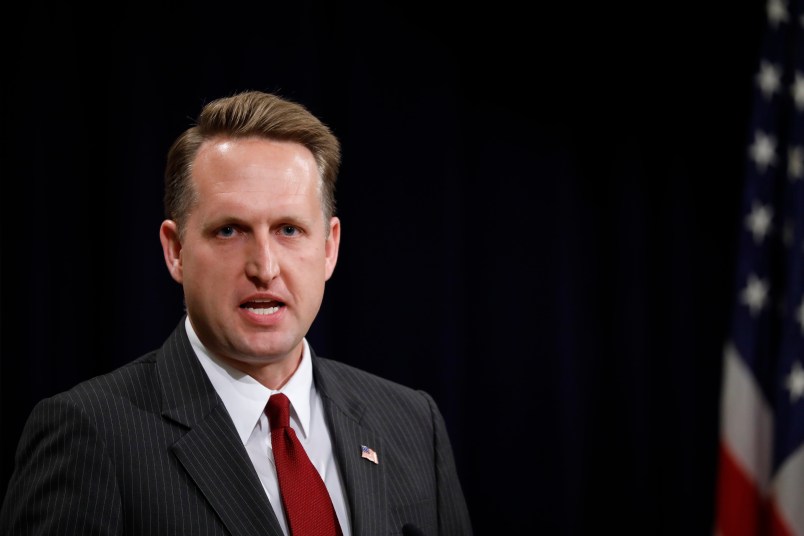The Justice Department said Thursday that the assertions of new, damning evidence in the census citizenship case were “false” in a fiery statement that nonetheless did not specifically dispute core claims in the latest allegations.
“These eleventh-hour allegations by the plaintiffs, including an accusation of dishonesty against a senior Department of Justice official, are false,” a Justice Department spokesperson said in the statement, which was issued more than 12 hours after the allegations were made public in court filings.
The challengers in the case have accused John Gore — a DOJ official who played a crucial role in the administration’s effort to include a citizenship question on the 2020 census — of false testimony for failing to disclose that he received a draft of a request to add the question from an outside advisor. Newly obtained documents revealed that the draft — allegedly passed along to Gore by the advisor, Mark Newman — was ghostwritten by a now-deceased Republican gerrymandering expert. The expert had conducted a study in 2015 that said a census citizenship question was needed to conduct a redistricting overhaul that would boost the GOP’s electoral advantages. The challengers claim that key points from the study made it into the formal request that Gore wrote.
“Before today, Mr. Gore had never heard of the unpublished study apparently obtained from the personal effects of a deceased political consultant,” the DOJ spokesperson said Thursday. “That study played no role in the Department’s December 2017 request to reinstate a citizenship question to the 2020 decennial census. These unfounded allegations are an unfortunate last-ditch effort to derail the Supreme Court’s consideration of this case. The Department looks forward to responding in greater detail to these baseless accusations in its filing on Monday.”
Gore did not disclose that he had received the draft from Neuman until well after a trial court had already decided the case. He admitted it in a closed door interview with Congress. However, Commerce Secretary Wilbur Ross quickly cast doubt on the claim, telling lawmakers in public testimony that Gore only “thought” it “might” have happened and that Neuman had denied passing the draft in his trial deposition.
The Justice Department did not respond to a follow-up inquiry by TPM seeking to clarify whether it was disputing that Gore received the draft from Neuman.
The Neuman draft included the rationale — that data from question would enhance Voting Rights Act enforcement — the Department would point to in its official request that the Census Bureau add the question. A key paragraph in that draft was in fact written by Thomas Hofeller, Republicans’ go-to consultant on redistricting issues until his death in 2018. Hofeller first suggested to the Trump transition team that it seek to add a citizenship question to the census, Neuman — a transition official who did not join the administration — said in a deposition. The challengers in the case are accusing Neuman of lying about the reasons Hofeller was recommending the question be added.
Neuman denied claims of lying in a statement to NPR that said “any inference that I would advocate actions that would harm the interests of the Latino community is wrong and offensive to me.”
The statement did not directly dispute the challengers’ allegation that Hofeller provided the key paragraph in Neuman’s draft.
A major issue in the case is whether VRA enforcement was the real reason the question was added, with the trial court judge having concluded that rationale was merely a pretext. Hofeller’s study — which was obtained by lawyers for the challengers after his estranged daughter found his hard drives — shows that he believed adding a citizenship question, rather than enhance minority representation, would lead to a new redistricting system that would advantage Republicans and non-Hispanic whites instead.






